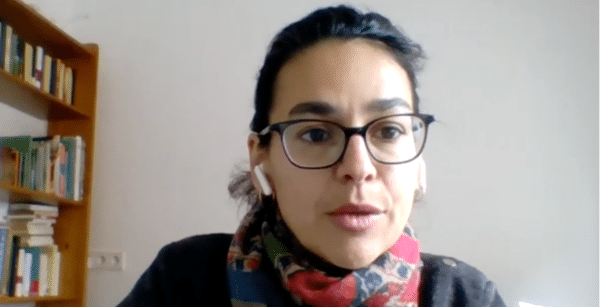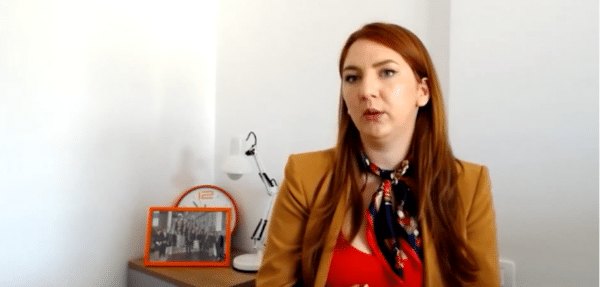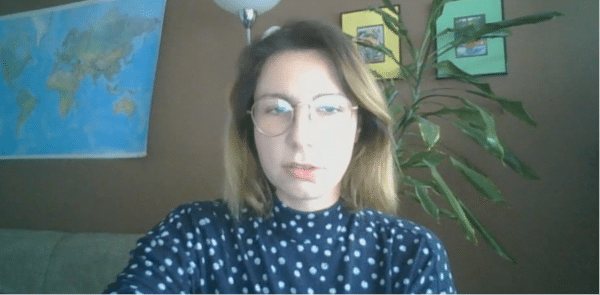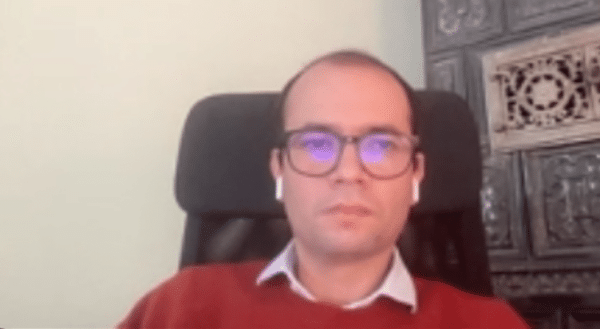15 March 2023 –
 Integrity in the public sector is at the very core of our work as civil society organizations fighting corruption. On March 2, 2023, 20 participants from the UNCAC Coalition Europe network discussed ways to ensure the integrity of our public servants through the regulation of conflicts of interest and the disclosure of their assets and interests. Together, we explored the challenges identified by anti-corruption organizations in conflict-of-interest legal and policy frameworks, with examples from Croatia, Montenegro, and Romania. We also considered the opportunities offered by electronic systems for the reporting and management of such declarations, as they enable stakeholders such as civil society organizations and journalists to access this information, expose compromising situations, and cooperate with law enforcement authorities.
Integrity in the public sector is at the very core of our work as civil society organizations fighting corruption. On March 2, 2023, 20 participants from the UNCAC Coalition Europe network discussed ways to ensure the integrity of our public servants through the regulation of conflicts of interest and the disclosure of their assets and interests. Together, we explored the challenges identified by anti-corruption organizations in conflict-of-interest legal and policy frameworks, with examples from Croatia, Montenegro, and Romania. We also considered the opportunities offered by electronic systems for the reporting and management of such declarations, as they enable stakeholders such as civil society organizations and journalists to access this information, expose compromising situations, and cooperate with law enforcement authorities.
Conflicts of interest are straightforward to define but complex to manage
In the public sector, a conflict of interest arises when “public officials have private-capacity interests which could improperly influence the performance of their official duties and responsibilities”, in the definition proposed by the OECD. Beyond this straightforward definition, the United Nations Convention against Corruption (UNCAC), as the only legally binding instrument to address corruption prevention among public officials, contains different provisions in its Chapter II on Prevention dealing with codes of conduct, conflicts of interest, and asset disclosure (in particular articles 7(4), 8(2) and 8(5), as well as article 52(5)). Soft policy instruments include the detailed OECD Guidelines for Managing Conflict of Interest in the Public Service and the Council of Europe Model Code of Conduct for Public Officials. The European Union passed rules on conflicts of interest in particular regarding public procurement, and in 2021 adopted further guidance on the avoidance and management of conflicts of interest for Member States’ authorities involved in the implementation of EU funds.
As much as governments are bound by the UNCAC, there is no universally accepted way to operate when facing a conflict of interest. The difficulty lies in that conflicts of interest are not corruption, which is understood as the abuse of entrusted power for private gain. However, left uncontrolled, they can result in a misuse of public funds and in corruption-related offenses such as abuse of public office, illicit enrichment, or, if we look at the private sector counterpart, trading in influence. Even perceived or potential conflicts of interest may damage the credibility of institutions and confidence in public decision-making. This is why governments must establish good mechanisms to regulate any conflict between private interests and official duty.
In this sense, asset and interest declarations have become a widespread tool to foster public sector integrity, with over 160 countries around the world having introduced financial disclosure systems, according to World Bank research. Such declarations require certain categories of public representatives to disclose to the appropriate authorities, if not to the general public, information about their personal assets (wealth) and interests (such as secondary employment or business ownership), with a certain periodicity. However, countries have different asset and interest declaration systems in terms of scope and level of transparency, and some are more successful than others.
Now is the time to review and correct the deficiencies of our existing legal and institutional integrity frameworks. And we have a good opportunity to do so, as governments are transitioning from paper-based to completely electronic systems for filing, managing, and disclosing asset and interest declarations. For civil society organizations, there is much to gain from the electronic shift because we can more easily cross-check and analyze comprehensive and well-structured data to uncover eventual conflicts of interest, as long as those data are public.
Advocating for reform and exposing conflicts of interest in Montenegro

The first presentation concerned Montenegro, a country in which legal progress has not been accompanied by better control and actual improvement of public sector integrity. Ana Đurnić, Public Policy Researcher at Institut Alternativa, explained why the Agency for Prevention of Corruption is not performing as expected and how civil society is working for conflicts of interest to be properly exposed and handled. The establishment of this Agency was a key requirement in the integration process of Montenegro into the European Union and has been operating since 2016, along with new legislation. It is in charge of determining and preventing conflicts of interest of public officials and of controlling their assets and income. With stronger capacities and a higher budget than the institutions it replaced, the Agency should have contributed to effectively preventing conflicts of interest at all levels of the public administration.
However, conflicts of interest are not being addressed, as assessed by the Council of Europe. Ana Đurnić pointed toseveral reasons behind the Agency’s failure to live up to its expectations. Firstly, this institution has many other responsibilities, including controlling lobbying, protecting whistleblowers, adopting and implementing integrity plans of Montenegrin authorities, controlling political party financing, and insufficient staff to perform all these duties, with only about 50 employees. Secondly, the Agency is not performing integrity checks by using income and assets declarations to determine the existence of a possible conflict of interest. For instance, the Agency does not look into a public official’s lifestyle to check whether it matches their reported income and assets, and does not sanction a civil servant when noticing that they are simultaneously performing as a member of parliament or have another political engagement prohibited by the law. This disconnection has led to overlooking obvious conflicts of interest. Thirdly, in terms of technology, the system is still hybrid: public officials are obliged to file a hard copy of their declaration in addition to the electronic form, which obliges the Agency to cross-check both versions. Finally, since the beginning, the Agency has faced accusations of being politically influenced and lacking independence which has affected citizens’ trust in it.
Fortunately, asset declarations are publicly accessible in Montenegro, enabling civil society organizations like Institut Alternativa to raise red flags when they detect discrepancies or potential conflicts of interest and report them to the Agency for Prevention of Corruption. However, few official investigations have been launched, and, in any case, fines are too low to act as a deterrent of wrong-doing. Amidst this critical situation, Ana Đurnić is now a member of a working group set up by the Parliament to amend the Law on Prevention of Corruption and reconsider the work of the Agency. Institut Alternativa supports the working group’s aim to expand the definition of a public official to corruption risk categories that are not currently covered by the law, including public procurement tender commissions and public-private partnerships, as well as to establish the Council of the Agency as a second-degree body to act upon complaints against the Agency’s decisions, to ease the work of the Administrative Court. Beyond their contribution to the outcomes of the working group, Institut Alternativa are using this role to make the process more open and ensure substantial inclusion of civil society: by calling for public consultations on the amendments, by conveying the recommendations of other civil society representatives, and by informing the wider public.
The new law to manage conflicts of interest in Croatia: a setback in the fight against corruption?

The next case study presented on Croatia showed similarities with the situation in Montenegro, in that legal reforms have not led to an improvement in the prevention of conflicts of interest in the public sector but, on the contrary, are even difficulting the general fight against corruption in the country.
Sanja Pavić, Lawyer at GONG, focused her presentation on how the Commission for the Prevention of Conflict of Interest has been weakened in its last reform, while the scope of asset declarations was broadened. The new law strengthening the rules for asset declarations in Croatia entered into force at the end of 2021. It brought with it the obligation for a greater number of persons, including board members of companies owned by local governments and heads of public health institutions, among others, to submit declarations once a year, even if they have not experienced any change in their assets. It also meant adding more information to already very comprehensive asset declarations. Finally, it granted the Commission for the resolution of conflicts of interest the possibility to impose higher minimum fines and introduced a new fine for the heads of public bodies who do not submit the required public information.
According to GONG, expanding the scope of those obliged to submit declarations and the type of information provided has not strengthened but jeopardized the Commission’s work. Due to a lack of resources, since the number of personnel was not increased accordingly, the Commission is now only able to do a preliminary administrative check for all the asset declarations received and is unable to perform the regular checks required by law, which consist of collecting and sharing data and comparing data from the submitted declarations with that acquired from the tax administration and other bodies. As a result, the Commission has become a mere body for administering asset declarations with less time for processing cases of conflicts of interest.
In addition, the Commission faces claims of having been captured and disempowered by the ruling party and has lost credibility as an independent institution, illustrated by the fact that the President of the Commission, who had initiated several proceedings against Croatia’s Prime Minister, recently failed to obtain a new mandate. Before the new law on conflicts of interest was adopted, GONG had advocated for operationalizing the principles of action in the exercise of public office and for imposing penalties for the violation of ethical principles, in line with the Council of Europe’s recommendations to Croatia. However, this situation did not improve as the government determined that the Commission had not been established to act as an ethical body. Instead, the government created a code of conduct to ensure the ethical conduct of state officials in executive bodies, whose implementation would be supervised by a Council mostly composed of members of the government. The result is that the government is monitoring its own conduct, even though there is an independent Commission that should be guaranteed independence and resources to do this task.
As a conclusion, Sanja recalled GONG’s standpoint that independent institutions should control those who have political power so that they do not abuse that power. If the body for preventing conflicts of interest is marginalized, it opens the door to corruption and implies a regression of democracy.
Making use of data from asset and interest declarations in Romania

Working as an expert in good governance and elections at Expert Forum, Septimius Pârvu ended the round of presentations with a more optimistic view on the system for asset and interest declarations in Romania and on how his organization is using these data. According to Septimius, his country has a solid legal regime to detect conflicts of interest and incompatibilities and a good framework to manage assets and interest declarations. The body in charge is the National Integrity Agency, an independent agency appointed by the Parliament and specialized in verifying the wealth of public officials, and it has been acknowledged as an efficient institution.
Declarations from Romanian public officials can be found on the web pages of the respective institutions and on the integritate.eu portal, containing today over 10 million files. There is a very broad scope of persons who have to submit such declarations, including candidates running for positions in local governments and councils. From 2021, declarations are submitted electronically through a dedicated platform, but this system is not fully functional yet since a certified electronic signature is required. Therefore, PDF documents coexist with electronic formats. Once the system is fully electronic, an important opportunity comes for anti-corruption organizations to export and use the data. Expert Forum advocates for all data from the new electronic declarations to be exported into open format (Excel, csv., etc). As the declarations include extensive information, not only of the obliged person, but also of their close relatives, they enable them to detect, for example, unjustified incomes, or undue political connections.
In this sense, Expert Forum has a proven track record of using publicly available data to research and illustrate systemic issues. For instance, in the area of health, they looked at political nominations, including the political profiling of thousands of heads of institutions at the local level by manually analyzing about 2,000 asset and interest declarations. In the area of political finance, in which finding data is especially difficult, Expert Forum developed a searchable database with over 3,000 names, including all donors in the history of Romania. When analyzing donations and loans to political campaigns, cross-checking asset and interest declarations with reports of political parties, they found in 2020 that around 30 persons had donated much more to the party than what they earned, according to their asset and interest declaration, and Expert Forum shared these findings with the Integrity Agency.
In the area of public procurement, they created the Public funds detector, a practical guidebook on how to follow the money on how budgets are formed, how investments are approved, and how public money is spent in public procurement. The guide integrates information from many sources and datasets, including the register of commercial entities, beneficial ownership information, land registers, political contributions, asset and interest declarations, etc., to establish the profile of businesses and persons with political connections. By monitoring public procurement processes and cross-checking them with public officials’ asset and interest declarations, they found, for instance, that a significant number of contracts had been awarded to their spouses’ companies, or to their extended family or political connections. They also found that few companies are awarded public contracts, and they analyzed in such cases if beneficiaries had obtained these contracts thanks to their political connections, shedding light on a systemic problem.
Between advocacy and data use: civil society’s quest for a meaningful contribution to public sector integrity
In the subsequent discussion, participants reflected on what the legal and policy frameworks to prevent and manage conflicts of interest in the public sector should look like in their countries. They also exposed how civil society organizations are actively seeking to detect and report conflicts of interest and to advocate for reforms, sometimes in adverse contexts.
In terms of challenges and opportunities, participants agreed that:
- Even with the best law on conflicts of interest on paper, the problem lies in its implementation. There essentially needs to be political will to properly implement these laws, and this is missing in several European countries. In Moldova, conflicts of interest may be in court proceedings for years or exist in front of the public opinion, without any action being taken, for instance, in a case where a mayor works with his wife as chief accountant of the municipality.
- To boost public sector integrity, international pressure from the European Union is useful to a certain extent , as is civil society pressure from within to change the status quo. For instance, in Montenegro a senator proposed a draft law that would prevent publishing asset declarations and he was forced to withdraw the amendment due to public pressure.
- Electronically handled and publicly available data from asset and interest declarations, with accessible and reusable formats, are a gold mine to help uncover conflicts of interest and wrongdoing of public servants. In some European countries, however, electronic and public declarations are not yet a reality. Even when there is a commitment from the government to reform conflict of interest legislation and enforcement, like in Hungary, it is not clear if the intention might be to keep data hidden than to really make them transparent and accessible.
- It is of utmost importance to introduce mechanisms to verify the data contained in the asset and interest declarations, following the recommendations that have been made for example by the World Bank Stolen Asset Recovery Initiative (StAR), to enforce sanctions for non-compliance, and to improve interoperability with other datasets.
Therefore, civil society organizations’ continued role of actively advocating for conflict of interest prevention and for openness is invaluable and really makes a difference. They are doing so through different means as participants showed, including:
- By cooperating with enforcement authorities and reporting any detected discrepancy.
- By taking part in governmental working groups, to provide expert policy advice on conflict of interest prevention, and to advocate for more transparency of asset and interest declarations.
- By undertaking monitoring and research projects: the Center for the Study of Democracy in Bulgaria is coordinating a project involving several other countries called Regional Good Governance Public-Private Partnership Platform, to share anti-corruption and good governance solutions between state institutions and civil society. In 2022, it focused on asset declarations and each country from Southeast Europe created a local report on asset declarations in their country. For instance, the Albanian Center for Economic Researchexamined how the declarations work in Albania and to what extent conflicts of interest are detected. A final report compiles the findings from each country, as well as compares the data and provides recommendations for reform.
- By creating new tools that build on open data, including from asset and interest declarations. For instance, the tool OpenScreening recently developed by Open Ownership and two other organizations can help uncover a conflict of interest by connecting open data from company registers, beneficial ownership registers, open sanctions data, politically exposed persons databases, among others, and establish connections.
If you are a civil society activist from Europe and would like to become involved, please contact our Regional Coordinator Ana Revuelta Alonso at ana.revuelta@uncaccoalition.org.



